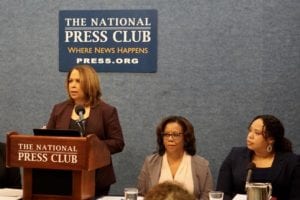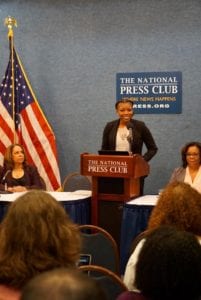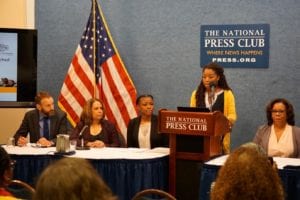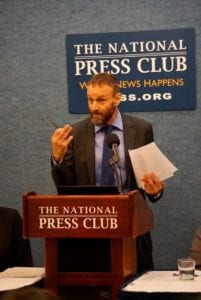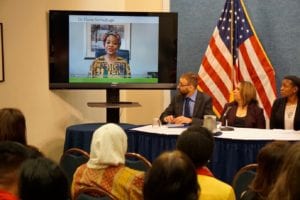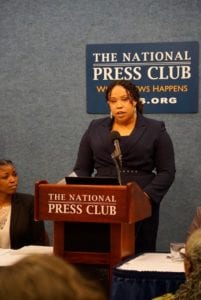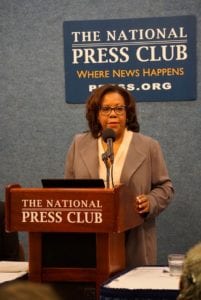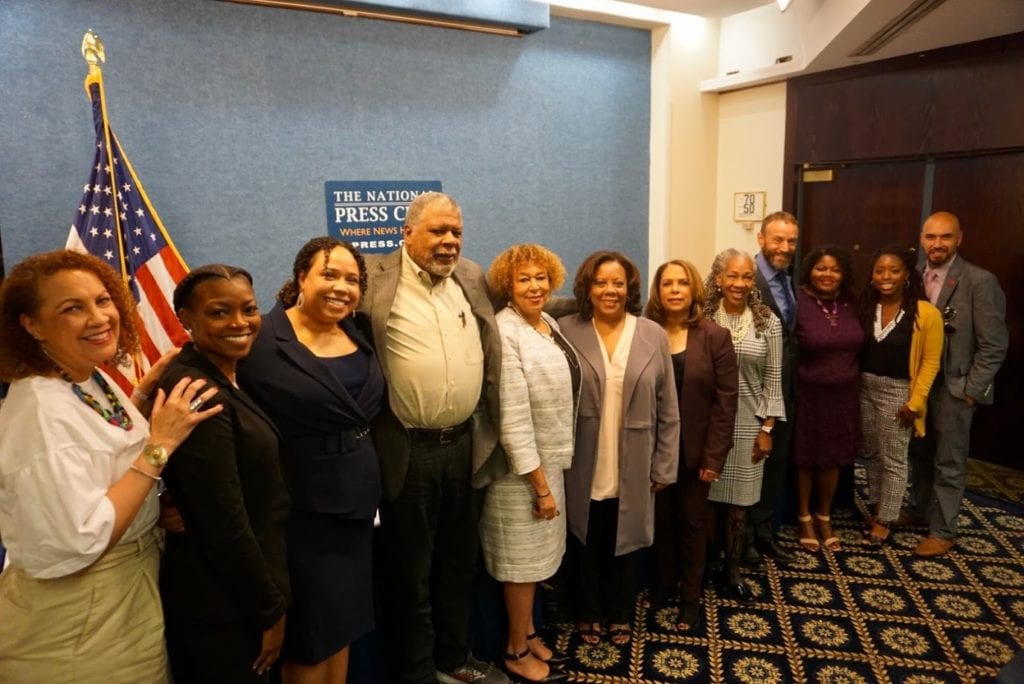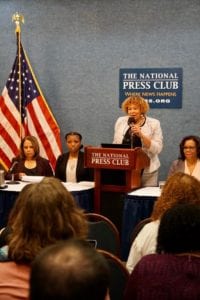
Carol McGruder, Co-Chair, African American Tobacco Control Leadership Council
“For every black man murdered, there are 6-8 dying of tobacco diseases.”
“We can’t wait until what’s happening with police brutality is solved to address thousands dying from cigarettes.”
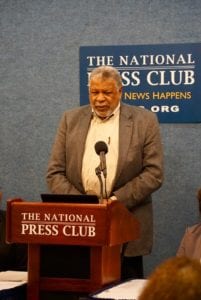
Dr. Phillip Gardiner, Co-Chair, African American Tobacco Control Leadership Council
“What brings us here today is 50 years of predatory marketing…This was intended, they did it purposefully and maliciously.
- “Menthol cigarettes are cheaper in the African American community… that’s the whole idea. Menthol allows the poisons and toxins to go down easier.”
“Menthol effects all sorts of people. Women disproportionately use menthol- 52%. 62% of Puerto Ricans smoke menthol…Native Hawaiians smoke in the 8-%. LGBTQ disproportionately smokes menthol. Smokers with mental health disorders. And of course, the poor. Groups that are marginalized are being targeted.”
Sharon Eubanks, Former Lead Prosecutor, U.S. Department of Justice
“The documents in tobacco litigation showed that Big Tobacco identified and targeted black communities, by design and intent.”
“Does the FDA not care about the people addicted to menthol? Does the FDA not care about youth uptake of menthol cigarettes?
Channte Keith, Director of Programs, National African American Tobacco Prevention Network, Inc.
“This law exempted menthol- a flavor most popular among young people and African Americans.”
LaTroya Hester, Communications, National African American Tobacco Prevention Network, Inc.
“There is a social injustice in the predatory marketing and death related to menthol in our community.”
“We will continue to lead this movement city by city until the work is done.”
Laurent Huber, Executive Director, Action on Smoking and Health (ASH)
“Every day menthol cigarettes remain on shelves, the U.S. is falling further behind global best practices.”
“The US is prioritizing the profits of Big Tobacco over the health of its African American citizens.”
Dr. Flavia Senkubuge, President College of Medicine South Africa/VP African Federation of Public Health Associations
“80% of young people who use menthol cigarettes are likely to become lifelong smokers.”
“We cannot have a tobacco free generation with the continued use of menthol cigarettes in particular populations, particularly Africans and African Americans.”
Natasha Phelps, Staff Attorney/Lead Minnesota Policy, Public Health Law Center
“The tobacco industry has long taken advantage of institutional racism… the scale of the problem is so great that we identify menthol as our commercial tobacco team’s top priority.”
“No state has banned the sale of menthol, but they can and should, to protect all of their citizens.”
Dr. Valerie Yerger, Founding Member, African American Tobacco Control Leadership Council
“The tobacco companies argue that smokers will be penalized for possession of menthol cigarettes…. We have been very clear, penalties are at the level of the retailers, not the user.”
“Restricting the sales of menthol and other flavored tobacco products will save lives.”
Watch the full press conference here.
##
The Plight of African Americans and Mentholated Tobacco Products: The Time is Now
WHAT: Press Briefing
WHEN: Thursday, May 23rd, 2019 9:00 am to 10:30 a.m.
WHERE: National Press Club, 529 14th St. NW, 13th Floor Washington, D.C.
The press briefing with be webcast live. Registration is mandatory for in-person attendees and web-viewers. To register click here.
Tobacco use remains the number one preventable cause of death for African Americans, claiming more than 45,000 lives annually. Due to decades of racialized targeting of mentholated tobacco products by the tobacco industry, over 80% of Black smokers use mentholated tobacco products. These targeted campaigns included manipulation of African American leadership groups, elected officials, Black media, ethnic specific advertising campaigns, and the free distribution of mentholated cigarettes to inner city children as young as nine years old. Many of these pernicious and racist practices are in direct violation of civil law statutes as well as international treaties.
The U.S. Department of Justice’s 2006 case against the tobacco industry delineated many of these practices and U.S. District Judge Gladys Kessler ruled that U.S. tobacco companies are in fact “federally adjudicated racketeers” under the Racketeer Influenced Corrupt Organizations (RICO) statutes. Judge Kessler put it bluntly in her 2006 – 1,700 page landmark ruling: “Over the course of more than 50 years, defendants lied, misrepresented and deceived the American public, including smokers and the young people they avidly sought as replacement smokers, about the devastating health effects of smoking.”
And while it is true that all Americans have been harmed by these practices, we posit that due to the historic oppression and racism endured by African Americans, this group deserves distinct protections, remedies, and treatments. Black communities historically besieged by a plethora of immediate and continuing issues are rendered defenseless to address this predatory tobacco industry behavior, thus making this equally an issue of social injustice.
The tobacco industry’s focused marketing has successfully promoted the use of these products among African Americans and is a major driver of present day tobacco-caused disparities, where Black males have the highest rates of death from lung cancer compared to any other demographic group. It is by no accident that 80% of Black adult smokers and 95% of Black youth smokers report smoking menthol-flavored cigarettes.
Though it has been ten years since the U.S. Food and Drug Administration was given the authority and mandate to act on mentholated tobacco products, they have yet to do so. Research confirms that a menthol sales ban would not only save millions of lives (Black lives in particular) and reduce youth smoking initiation, it would be welcomed by the majority of African American smokers. It has been well-documented that mentholated cigarettes and other flavored tobacco products are responsible for the initiation of smoking among our youth, as well as the difficulty in successful quitting among established smokers. The FDA’s inaction has prompted municipalities across the country to protect youth and adults from these deadly products by enacting local ordinances that ban the sale of mentholated and flavored tobacco products.
This international briefing will provide the press and the greater community an update on where the menthol/flavor ban movement stands today, the status of the landmark 2006 Kessler ruling, international treaty violations (including the targeting of African countries), and local and civil actions that have been successfully implemented or won.
Press briefing speakers are prominent U.S. and international tobacco control advocates, researchers, attorneys, and elected officials.
Speakers
Hon. Karen Bass, U.S. House of Representatives, 37th District (CA)
Hon. Malia Cohen, Fmr. President of San Francisco Board of Supervisors, Chair, California State Board of Equalization
Carol McGruder, Co-Chair, African American Tobacco Control Leadership Council
Dr. Phillip Gardiner, Co-Chair, African American Tobacco Control Leadership Council
Dr. Valerie Yerger, Founding Member, African American Tobacco Control Leadership Council
Sharon Eubanks, Former Lead Prosecutor, U.S. Department of Justice
Laurent Huber, Executive Director, Action on Smoking and Health (ASH)
Natasha Phelps, Staff Attorney/Lead Minnesota Policy, Public Health Law Center
Channte Keith, Director of Programs, National African American Tobacco Prevention Network, Inc.
Flavia Senkubuge, President College of Medicine South Africa/VP African Federation of Public Health Associations
African American Tobacco Control Leadership Council
Formed in 2008, the African American Tobacco Control Leadership Council (AATCLC) partners with community stakeholders, elected officials and public health agencies to inform the national direction of tobacco control policy, practices and priorities, as they affect the lives of Black-American and African immigrant populations. The AATCLC has been at the forefront in elevating the regulation of mentholated and other flavored tobacco products on the national tobacco control agenda. https://savingblacklives.org
Action on Smoking and Health (ASH)
Founded in 1967, Action on Smoking and Health (ASH) is America’s oldest anti-tobacco organization, dedicated to a world with ZERO tobacco deaths. Because tobacco is the leading cause of preventable death worldwide, ASH supports bold solutions proportionate to the magnitude of the problem. https://ash.org
National African American Tobacco Prevention Network (NAATPN), Inc.
NAATPN.Inc. is a 20-year-old organization that exists to facilitate the implementation and promotion of comprehensive policies, community-led programs and culturally competent public health campaigns that benefit African Americans. We are committed to addressing the social and economic injustices that have marginalized our communities and led to deep health disparities. NAATPN is fortified by a network of community organizations, grassroots organizers, faith leaders, legislators, clinical service providers, researchers and media professionals.
The Public Health Law Center
The Public Health Law Center collaborates with others to reduce and eliminate commercial tobacco, promote healthy food, support physical activity, and address other causes of chronic disease. Our belief in health and equity for all people is at the core of our work. Our partnerships include Tribal health leaders, federal agencies, national health advocacy organizations, state and local governments, planners, researchers, attorneys, community coalitions, and individuals working on public health issues. Our deep knowledge, our thoughtful legal and policy analysis, and our individualized approach help these partners create healthier communities around the country. For more information, visit www.publichealthlawcenter.org.
African Federation of Public Health Associations
